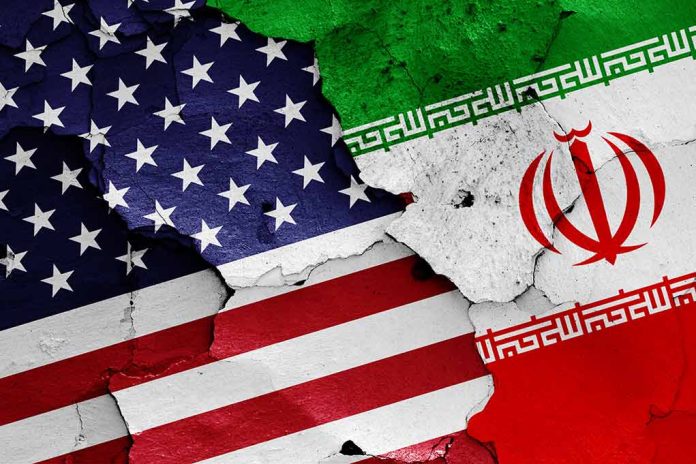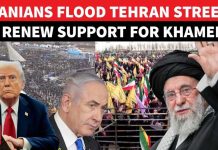
Iran has formally rejected President Trump’s proposal for direct nuclear negotiations, setting the stage for a potentially dangerous standoff between the two nations.
Key Takeaways
- President Trump sent a letter to Iran’s Supreme Leader proposing direct nuclear negotiations with both a peace deal option and military action warning
- Iran rejected direct talks but indicated openness to indirect negotiations, as conducted in the past
- Ayatollah Khamenei called the US approach “deception” aimed at exerting dominance rather than solving issues
- The US maintains a “maximum pressure” strategy with sanctions targeting Iran’s energy sector since withdrawing from the 2015 nuclear deal
- International monitors report Iran continues expanding its enriched uranium stockpile, escalating concerns
Trump’s Diplomatic Overture
Former President Donald Trump recently extended a direct offer to Iran’s Supreme Leader Ayatollah Ali Khamenei regarding the nation’s controversial nuclear program. The letter outlined two distinct paths forward: either negotiate a peace deal potentially involving Iranian oil concessions, or face military intervention. Trump’s special envoy Steve Witkoff emphasized a preference for diplomatic channels, stating simply, “We don’t need to solve everything militarily.”
National Security Adviser Mike Waltz reinforced the serious nature of the United States’ position, declaring that “all options are on the table” should Iran fail to dismantle its nuclear program. This approach reflects the reinstatement of Trump’s “maximum pressure” strategy, which includes sanctions targeting Iran’s energy sector. The administration’s stance follows intelligence assessments and reports from the International Atomic Energy Agency indicating Iran continues expanding its enriched uranium stockpile.
Iran’s Firm Rejection
Iran’s response, delivered through Omani intermediaries, was unequivocal in its rejection of direct negotiations under current conditions. Foreign Minister Abbas Araghchi publicly acknowledged the communication, stating, “This official response includes a letter in which our position regarding the current situation and Mr. Trump’s letter has been fully explained to the other party.” The response underscored Iran’s refusal to engage in talks while under what they perceive as coercive measures.
“Our policy remains not to negotiate directly (with Washington) under ‘maximum pressure’ and the threat of military action, but indirect negotiations, such as those that took place in the past, can continue,” Iranian Foreign Minister Abbas Araghchi said.
Ayatollah Khamenei, Iran’s supreme leader, dismissed Trump’s proposal as “a deception,” elaborating that negotiations with the United States would not address genuine concerns. “Such negotiations aren’t aimed at solving issues. Their aim is to exert their dominance,” Khamenei declared, effectively closing the door on direct diplomatic engagement while maintaining a defiant stance against what Iran characterizes as foreign pressure tactics.
Historical Context and Current Stakes
The current impasse follows years of deteriorating relations since the United States withdrew from the 2015 Joint Comprehensive Plan of Action (JCPOA) in 2018. That decision reintroduced sanctions against Iran, prompting Tehran to progressively abandon its commitments under the original agreement. Tensions have steadily increased as Iran accelerated uranium enrichment activities while maintaining its position that its nuclear program serves peaceful purposes only.
“Hopefully, we will have a peace deal. I’m just saying I’d rather see a peace deal than the other. But the other will solve the problem,” Trump stated regarding the situation.
For American national security interests, the stakes remain extraordinarily high. Officials have consistently emphasized that Iran must not develop nuclear weapons, a position shared with regional allies, particularly Israel. Reports indicate both nations continue evaluating military contingencies should diplomatic efforts fail completely. Meanwhile, Iran maintains that indirect negotiations through intermediaries like Oman could potentially continue, preserving a narrow diplomatic channel amid otherwise hardened positions.
Sources:
- https://www.newsweek.com/trump-witkoff-iran-nuclear-waltz-2049388
- https://timesofindia.indiatimes.com/world/middle-east/not-to-negotiate-directly-iran-responds-to-trumps-nuclear-talks-proposal/articleshow/119628898.cms
- https://www.theepochtimes.com/world/iran-responds-to-trumps-letter-offering-to-negotiate-a-new-nuclear-deal-5832479



